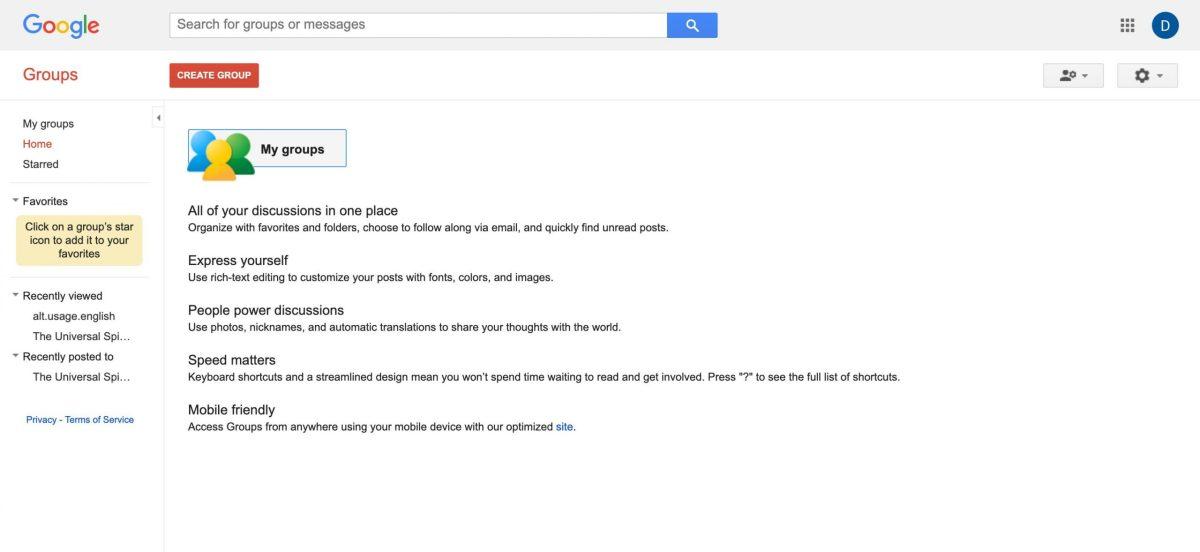Last Wednesday students gathered in Green Hall for a town hall meeting on revoking the access of school wide emails for faculty, staff and individual students. Among many lingering questions, this change in policy was the clear take away from the town hall that was hosted by an ad hoc committee, the Communications Committee (CommComm) and the Senate Politics and Ethics Committee (SPEC).
The town hall convened this semester because the administration is planning for major changes to Wellesley’s Google Group policy, which currently gives all students access to the Groups. To address the issue, an ad hoc committee of seven students formed to put together policy recommendations. When the policy recommendations are implemented — potentially in spring 2020 — only certain people will have access to all of the Groups, and be able to email the entire student body. The questions addressed in the town hall included who those people are going to be, when individual students should be able to send a schoolwide email and who determines when a given email is going to be sent out.
About two weeks ago, Daniela Limbania ’21, SPEC chair and a member of the ad-hoc committee, sent out a Google Form asking students for their thoughts on these questions. The 86 submitted responses guided the discussion during the town hall, which was far more than the 20 responses that the committee received on the same questionnaire last year.
“We have multiple options, nothing is set in stone,” Limbania explained at one point, acknowledging that final decisions have yet to be made on most major pieces of the policy. According to the survey, the most popular answers as to which bodies should get full access to school wide emails include academic departments, residential life through the House Presidents’ Council (HPC), class council presidents, Administration and College Government (CG) committee chairs.
As for what circumstances should give individual students access to the Google Groups, the most popular options were CG candidates and student activists. Over 70 percent of survey respondents thought the emails should be moderated by a student being paid by the Office of Student Involvement (OSI).
A major feature of the Google Groups overhaul will be the shift to WEngage, a platform for orgs to communicate with their members that will be available to the entire student body. Through WEngage, org leaders can use a calendar feature to post meeting times and send reminder notifications, and the platform will also have an RSVP function. Jess Grady, the new director of student involvement at Wellesley, attended the town hall and explained the details of WEngage. Currently, OSI has administrative capabilities on the site, but she says that more control will soon be going back to org leaders. “We want you to be able to customize your page… that is what is really going to attract students to your org,” Grady said.
Much of the discussion at the town hall was centered on the when and how of schoolwide emailing. Some worried about what the shift to WEngage would mean for unconstituted orgs, who might struggle to reach out to people and build their membership without access to the student body. One suggestion was to include them in a weekly digest to publicize their information, another to go directly to the orgs chair and have them send out an email.
Another consideration along those lines involves schoolwide invitations for social events, and where they fall amidst these changes. There are many that org leaders want to be publicized, such as cultural performances and parties, that hope to draw in as much of the student body as possible. The distinction between those and events that should only be broadcast within an org was discussed at length, but the town hall did not produce any specific answers as to where the line is drawn.
Just over 20 students attended the town hall, which lasted an hour and a half and was followed by a fifteen minute question and answer session with Vice President and Dean of Students Sheilah Horton.
Though Horton’s Q&A session was largely focused on the timeline for these changes, she started by expressing her excitement about WEngage and said that it had “revitalized” student life at an unnamed previous school where it was implemented.
Horton moved on to emphasize that this was not a sudden decision on the Administration’s part to revoke universal access to the Google Group. Rather, it had been mulled over for years and is moving forward with the formation of the ad-hoc committee.
According to Dean Horton, when and how access is revoked is largely dependent on student feedback. “I could have this thing written tomorrow,” Horton said of the new policy. She explained that it has been strung out because it is important to get student voices on the execution. One attendee then asked Dean Horton whether this town hall would be the last that students hear about the policy until their access is revoked. Her response was that she hoped administration and students could go “back and forth” adjusting the policy before the spring. After the town hall, the ad-hoc committee is going to come together once more to write a memo with suggestions for the administration. Still, it has not been determined how student voices will be incorporated into the final draft, whether students will have a hand in writing the policy, or how revisions to the policy will be implemented.
Although one of the main considerations is the final decision as to who will have access, Horton notes that there are some other “moving pieces” that the administration needs to lock down. Limbania worries that it will make for a shakier transition if much of the student body is taken by surprise by the changes. Yet changes will come, regardless of how prepared students are to lose schoolwide email privileges. “We now just need to come up with something and try it,” said Horton.






